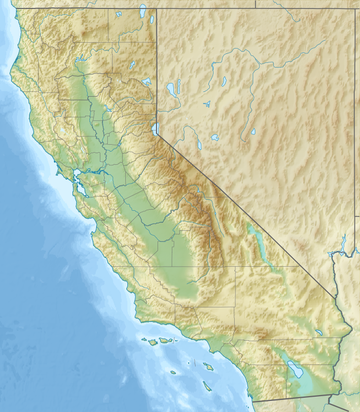Kuna Peak
| Kuna Peak | |
|---|---|
 Kuna Peak at center, southwest aspect | |
| Highest point | |
| Elevation | 13,008 ft (3,965 m) NAVD 88[1] |
| Prominence | 1,922 ft (586 m)[1] |
| Listing | Western States Climbers Emblem peak[2] |
| Coordinates | 37°48′46″N 119°12′28″W / 37.8127069°N 119.2076479°W[3] |
| Geography | |
| Location | Mono and Tuolumne counties, California, U.S. |
| Parent range | Kuna Crest, Sierra Nevada |
| Topo map | USGS Koip Peak |
| Climbing | |
| First ascent | 1919 by Walter L. Huber[4] |
| Easiest route | Traverse from Koip Peak, class 2[4] |
Kuna Peak is a summit on the boundary between Mono and Tuolumne counties, in the United States,[3] is the highest point on Kuna Crest.[5] With an elevation of 13,008 feet (3,965 m), Kuna Peak is the 146th-highest summit in the state of California,[6][7] and is the third-highest mountain in Yosemite National Park.[8][9]
Name
[edit]The word Kuna probably derives from a Shoshonean word meaning "fire," appearing in the Mono dialect of the area, with a meaning of firewood.[10][11] On the summit, there are many jagged pieces of rock which resemble fire themselves; see Kuna Crest Granodiorite.
Geography
[edit]Kuna Peak is flanked by shorter peaks all of which are nearly equal in height, such as Koip Peak, which is a mile to the east, and is 40 feet (12 m) feet lower.[5] The western side of Kuna Peak is in Yosemite National Park, the eastern side being in the Ansel Adams Wilderness.[12]
The following features are near Kuna Peak:
- Alger Lakes
- Bingaman Lake
- Donohue Peak
- Koip Glacier
- Koip Peak
- Koip Peak Pass
- Helen Lake
- Kuna Lake
- Kuna Glacier
- Mammoth Peak
- Mono Pass
- Mount Andrea Lawrence
- Mount Lewis
- Parker Pass
- Parker Peak
- Spillway Lake
Climate
[edit]| Climate data for Kuna Peak 37.8193 N, 119.2202 W, Elevation: 12,431 ft (3,789 m) (1991–2020 normals) | |||||||||||||
|---|---|---|---|---|---|---|---|---|---|---|---|---|---|
| Month | Jan | Feb | Mar | Apr | May | Jun | Jul | Aug | Sep | Oct | Nov | Dec | Year |
| Mean daily maximum °F (°C) | 28.4 (−2.0) |
27.1 (−2.7) |
29.8 (−1.2) |
33.8 (1.0) |
41.3 (5.2) |
50.7 (10.4) |
58.4 (14.7) |
57.9 (14.4) |
52.4 (11.3) |
43.8 (6.6) |
34.7 (1.5) |
28.4 (−2.0) |
40.6 (4.8) |
| Daily mean °F (°C) | 18.9 (−7.3) |
17.0 (−8.3) |
19.2 (−7.1) |
22.3 (−5.4) |
29.5 (−1.4) |
38.6 (3.7) |
45.9 (7.7) |
45.2 (7.3) |
39.8 (4.3) |
32.2 (0.1) |
24.6 (−4.1) |
19.0 (−7.2) |
29.4 (−1.5) |
| Mean daily minimum °F (°C) | 9.3 (−12.6) |
6.8 (−14.0) |
8.6 (−13.0) |
10.7 (−11.8) |
17.8 (−7.9) |
26.4 (−3.1) |
33.4 (0.8) |
32.5 (0.3) |
27.2 (−2.7) |
20.7 (−6.3) |
14.4 (−9.8) |
9.6 (−12.4) |
18.1 (−7.7) |
| Average precipitation inches (mm) | 12.00 (305) |
9.65 (245) |
9.04 (230) |
5.24 (133) |
2.73 (69) |
0.66 (17) |
0.61 (15) |
0.43 (11) |
0.61 (15) |
2.92 (74) |
4.02 (102) |
10.16 (258) |
58.07 (1,474) |
| Source: PRISM Climate Group[13] | |||||||||||||
Gallery
[edit]References
[edit]- ^ a b "Kuna Peak, California". Peakbagger.com. Retrieved December 4, 2014.
- ^ "Western States Climbers Qualifying Peak List". Climber.org. Retrieved March 27, 2016.
- ^ a b "Kuna Peak". Geographic Names Information System. United States Geological Survey, United States Department of the Interior. Retrieved December 4, 2014.
- ^ a b Secor, R.J. (2009). The High Sierra Peaks, Passes, and Trails (3rd ed.). Seattle: The Mountaineers. p. 397. ISBN 978-0898869712.
- ^ a b Gordonye. "Kuna Peak, California, United States, North America". summitpost.org. Retrieved February 6, 2019.
- ^ "California Thirteeners". Vulgarian Ramblers. Retrieved March 14, 2016.
- ^ "Kuna Peak". SummitPost.org. Retrieved December 4, 2014.
- ^ Kelliher, Mat. "Yosemite NP Peaks". peakbagger.com. Retrieved March 24, 2019.
- ^ Mrchad9. "Yosemite's Highest Peaks". summitpost.org. Retrieved March 24, 2019.
{{cite web}}: CS1 maint: numeric names: authors list (link) - ^ Farquhar, Francis P. (1926). "Place Names of the High Sierra". yosemite.ca.us. Retrieved February 6, 2019.
- ^ Kroeber, A.L. (2007). "California place names of Indian origin". Retrieved February 6, 2019.
- ^ "Attractions in Kuna Peak". guroute.com. Retrieved February 6, 2019.
- ^ "PRISM Climate Group, Oregon State University". PRISM Climate Group, Oregon State University. Retrieved October 6, 2023.
To find the table data on the PRISM website, start by clicking Coordinates (under Location); copy Latitude and Longitude figures from top of table; click Zoom to location; click Precipitation, Minimum temp, Mean temp, Maximum temp; click 30-year normals, 1991-2020; click 800m; click Retrieve Time Series button.


